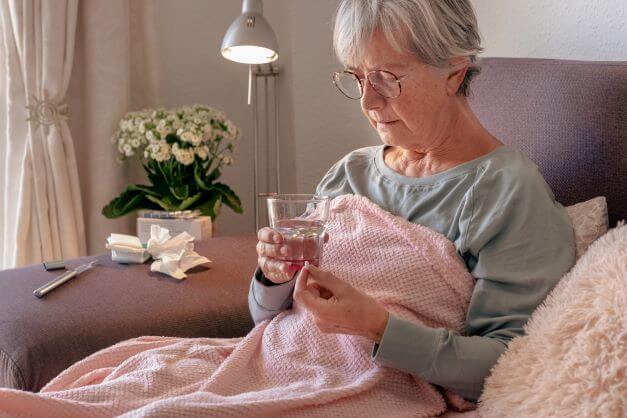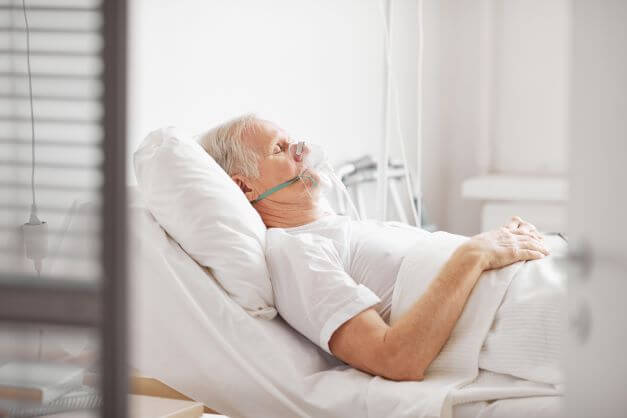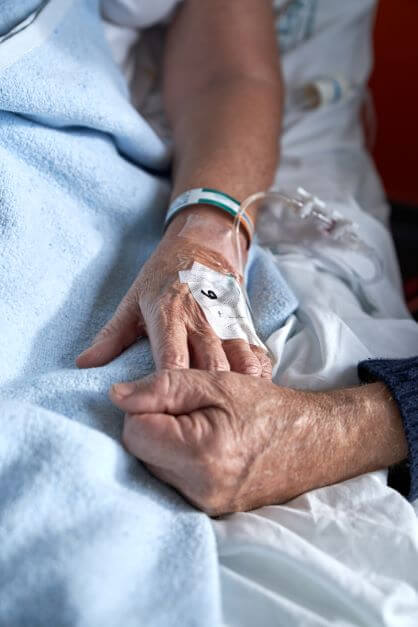When you are a Dementia caregiver, you usually settle into a routine with your loved one. The changes typically come along slowly, but sometimes, a little chaos is thrown into that routine. You may wake up to a completely different person than you saw the day before.
The calm, mild manner person from yesterday may now be angry, mean, and throwing things.
If you are an experienced caregiver, your first thought is uh-oh looks like a UTI (urinary tract infection). But many caregivers don’t know that Dementia dehydration can cause similar effects as a UTI.

Signs of Dementia Dehydration
There are quite a few signs of dehydration. However, if you know what to look for you can catch it before it becomes severe.
- Dry eyes, lips, tongue, and mouth
- Fatigue
- Weakness
- Sleepiness
- Weight loss
- Decrease in urination (less than 4x/day or going eight or more hours without urination is often a sign of dehydration),
- Dark urine (should be straw-colored or lighter)
- Dizziness or lightheadedness
- Decreased skin elasticity
- Increased levels of confusion
- Changes in behavior
- Agitation
- Muscle cramping, especially in the legs and arms
- Nausea
- Headaches
- Development of UTIs
Severe Dehydration signs
- Sunken eyes
- Decreased sweating
- Lower blood pressure
- Skin tenting
- Faster breathing
- Faster heart rate than usual (>100 beats per minute is considered high)
- Trouble walking
- Fainting
- Seizures
What Causes Dehydration?
Dehydration happens in all elderly, not just those with Dementia. This is because the body doesn’t hold as much water as it used to
Underlying health conditions also can contribute to dehydration. For example, the kidneys don’t work as well as they used to, and Diabetes can cause damage to the nerves that are responsible for the urinary system. As a result, more fluid is lost in urination.
Medications
The three main medicines that may cause dehydration in dementia patients are laxatives, diabetic medication, and diuretics.
Laxatives can cause your body to flush out too much water and should be used cautiously and with your doctor’s approval. In addition, some diabetic medicines affect the kidney, causing them to pull more water out of the body.
Diuretics are commonly used to treat high blood pressure and reduce heart stress. In addition, they work on the kidneys to help you urinate out excess water. As a result, less fluid in your body equals less pressure against the blood vessel walls.
People with Dementia are at a much higher risk of developing dehydration.
They forget to drink and, at some point, can no longer recognize thirst. As a result, they become unable to make their needs known.

How to prevent Dementia dehydration
You will need to become creative in keeping them hydrated. For example, keep water within reach and remind them frequently to take a drink. Attractive cups with lids may help. Some people have found setting the alarm or leaving written reminders helps to motivate them if they are in the early to middle stages of the disease.
Provide their favorite drinks. Their sweet tasters are the strongest; you will find them more compliant when offering sweet beverages. Most people forget about popsicles as we age, but they work well. Especially for those who remember their younger days and believe they are younger.

Several fruits and vegetables are full of water, such as watermelon, oranges, peaches, cucumber, celery, and strawberries.
It helps to offer them a variety of different drinks. Sports drinks are also an option; recently, I discovered Jelly Drops for people with Dementia. Here is the link Jelly Drops

Offer coffee and tea sparingly, as they can have diuretic effects and can dry them out. But if that is their favorite drink and helps keep them happy, make sure you offer other beverages throughout the day. Remember to aim for 4 to 6 cups of fluid a day.

Dementia Dehydration and Delirium
Delirium is different from Dementia. Delirium comes on quickly over 1-2 days and can lead to severe problems if not treated timely.
Anyone can get Delirium, but those with Dementia are at a much higher risk.
Delirium can be caused by:
- pain
- infection
- poor nutrition
- constipation or urinary retention
- dehydration
- low levels of blood oxygen
- a change in medication
- abnormal metabolism (for example, low salt or blood sugar levels)
- an unfamiliar or disorientating environment
The treatment for Delirium is to address the cause. If they are dehydrated, getting fluids in their system is the first line of treatment. Delirium usually improves but not always. It can take days, weeks, or months, and they may never bounce back from Delirium. I have seen many patients who developed Delirium in the hospital get sent to a nursing home because the family could no longer take care of them at home.
Shelter of Calm:
Your Guide Through Dementia's Storm!
Is Dementia's chaos stealing your peace?
We're here to restore the calm, empowering you to confidently face each challenge.
Take the first step towards transformation now.

End-stage Dementia and Dehydration
As the end stage of Dementia approaches, your loved one will lose their appetite and refuse to take food, water, or any nutrition. They will have swallowing problems and begin choking on food and drink. This is a normal part of the disease process as the body slowly shuts down.

Many caregivers and family members struggle with making decisions during this time. In addition, they are concerned their loved one may be experiencing discomfort from dehydration. Often the question of tube feeding or IV fluids is brought up. However, dehydration is a normal part of the dying process, decreasing discomfort during this transition. Providing fluids at this time may cause distress due to fluid building up in their lungs.

It is best to have a conversation regarding end-of-life care as early in the disease as possible, so you know the wishes of your loved one. Most people with Dementia simply want to let nature run it course.
The Dementia Caregiver Blog Library
Activities, Advanced Directives, Agitation, Apathy, Approach, Apps for Caregivers, Basic Caregiving, Bathing, Bathroom Safety, Caregiver Burnout, Caregiver Compassion, Caregiver Emotions, Caregiver Help, Caregiver Loneliness, Caregiver Support, Cold & Flu Season, Communication Challenges, Dehydration, Dementia Complications, Dementia Doctors, Dementia Safety Home, Dementia Types, Dementia-Friendly, Dressing Issues, Driving Safety, Eating Problems, Fall Prevention, Family Help, Finances, Guns & Dementia, Harm Prevention, Healthcare, Help at Home, Hiding Dementia, Holidays, Hospice, Hospital Stay, In-Between Stage, Kitchen Safety, Laughter, Legal Healthcare, Marijuana use, Medication Tips, Music, Nutrition, Pain, Patience, Poop Problems, Relationships, Reminiscing, Routine, Safety, Sense of Purpose, Shadowing, Sleep Issues, Stages of Dementia, Sundowning, Television, Time Travel, Traveling, Toileting, Wandering
Exploring Caregiving Tools & Resources? Don't Forget to Check Out My Resource Page! 🌟

Hi, I’m Larea, a Certified Dementia Specialist and Registered Nurse with 30 years of hands-on experience helping dementia patients in various settings, from hospitals to nursing homes and hospice. Drawing on personal experiences with my family members and patients over the years, I’m here to help guide you on your caregiving journey.


0 Comments